Our approach
Health and welfare are fundamental pillars for aquaculture sustainability, and farming companies maximise them through effective health management practices. Generally, these practices are included in an integrated and holistic approach that focus on health risks mitigation and disease prevention.
This approach should include best management and husbandry practices, continuous surveillance and early and accurate diagnosis - essential for an early intervention when a challenge occurs - implementation of biosecurity and disinfection procedures in the production sites, responsible use of medicines when treatment is needed and systematic vaccination.
Health and welfare are areas where Skretting can have a significant impact in partnership with our customers. Helping to make sure that fish and shrimp are raised with optimal nutrition and good welfare is essential for Feeding the Future and can have a significant impact on human health.
At Skretting, we offer nutritional solutions and functional diets, to support fish and shrimp resistance and resilience, that are an important part of integrated preventative practices. Our specialised diets provide optimal nutrient formulation and include functional ingredients with the aim to mitigate the impact of the diseases and nutritionally support the animal during challenging conditions.
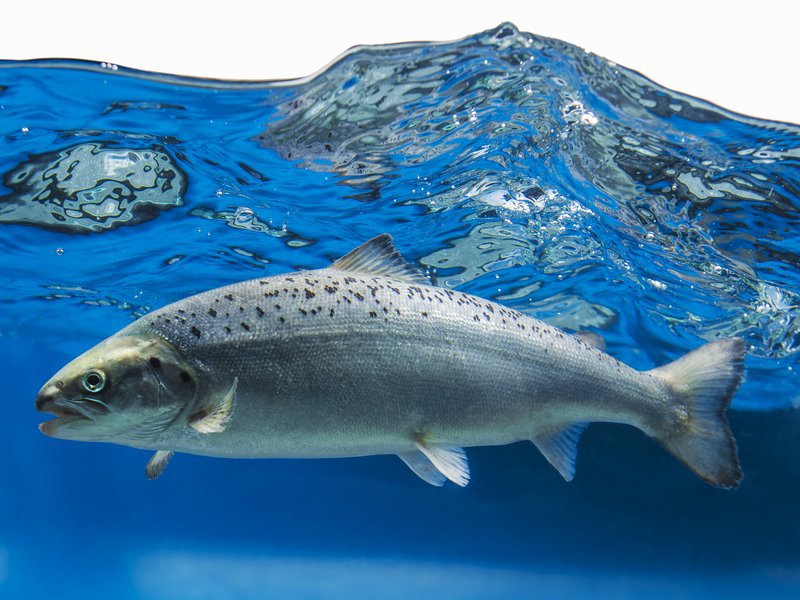
Addressing Antimicrobial Resistance (AMR)
While Skretting recommends a holistic approach to fish and shrimp health, whereby prevention through farming best-practices is better than cure, it’s important to highlight that despite all the preventative measures aimed at reducing disease risks, aquatic species still face various health challenges. In these instances, medicated feeds remain the least invasive method of administering antibiotics, facilitating an effective treatment of these animals in a controlled, safe, and welfare-friendly manner.
All our medicated feed sales are based on a veterinary prescription with a valid clinical diagnostic, and are produced under controlled, high-quality conditions in separate production lines to avoid the risk of contaminating standard feed. The use of medicines in aquaculture is subject to specific laws and regulation, which Skretting strictly follows.
Our RoadMap 2025 targets
Ensure no prophylactic usage of antibiotics employed in feed, forage or water.
 Our progress
Our progress
No use.
Specific SDG sub-targets addressed
Initially there was no explicit mention of AMR in the SDG sub-targets. Through various advocacy measures over the years, AMR was recognised as a threat to people’s livelihoods, lives and environment. In March 2020, a new SDG sub-target was created to address AMR: SDG sub-target 3d2: “Percentage of bloodstream infections due to the presence of selected antimicrobial resistant organisms.
Ensure no use of antibiotics and/ or coccidiostats for effect of growth promotion.
 Our progess
Our progess
No use.
Specific SDG sub-targets addressed
Initially there was no explicit mention of AMR in the SDG sub-targets. Through various advocacy measures over the years, AMR was recognised as a threat to people’s livelihoods, lives and environment. In March 2020, a new SDG sub-target was created to address AMR: SDG sub-target 3d2: “Percentage of bloodstream infections due to the presence of selected antimicrobial resistant organisms.
Ensure the use of antibiotic medication can only be applied to feed and water with a valid clinical diagnostic result demonstrating bacterial infection and under direct and approved medical supervision by a qualified veterinarian.
 Progress
Progress
No use.
Specific SDG sub-targets addressed
Initially there was no explicit mention of AMR in the SDG sub-targets. Through various advocacy measures over the years, AMR was recognised as a threat to people’s livelihoods, lives and environment. In March 2020, a new SDG sub-target was created to address AMR: SDG sub-target 3d2: “Percentage of bloodstream infections due to the presence of selected antimicrobial resistant organisms.
Ensure no use of any antibiotic or related medications that are listed in the World Health Organisation’s overview of Critically important antimicrobials for human medicine (CIA) (6th revision)
O ur progress
ur progress
In 2021 Skretting produced used 2,137 kg of CIA active ingredient. All of the feeds sold were prescription based.
Specific SDG sub-targets addressed
Initially there was no explicit mention of AMR in the SDG sub-targets. Through various advocacy measures over the years, AMR was recognised as a threat to people’s livelihoods, lives and environment. In March 2020, a new SDG sub-target was created to address AMR: SDG sub-target 3d2: “Percentage of bloodstream infections due to the presence of selected antimicrobial resistant organisms.
Reflection on progress
Our focus in 2021 was to continue with our mapping and understanding of the use of antibiotics listed as CIA as a part of our Roadmap 2025 goals. As part of the outcome we identified that the main use is generated from:
- Erythromycin - Gram positive bacteria (Lactococcosis, Bacterial Kidney Disease). Generally vaccines don’t work well and/or warmer weather increases the incidence of certain diseases.
- Oxolinic acid and Flumequine – Pasteurelosis, Vibriosis, Furunculosis. Small volumes – mainly used in few cases with disease outbreaks.
Factors that drive the use:
- Vaccination failure (poor/no availability, poor efficacy, deficient vaccination programs).
- Environmental conditions.
In Skretting we don’t limit our work to only reduce our sales of CIA. We want to be transparent and are open to engage and collaborate with external stakeholders to find new alternatives that reduce the dependency on any antibiotics.
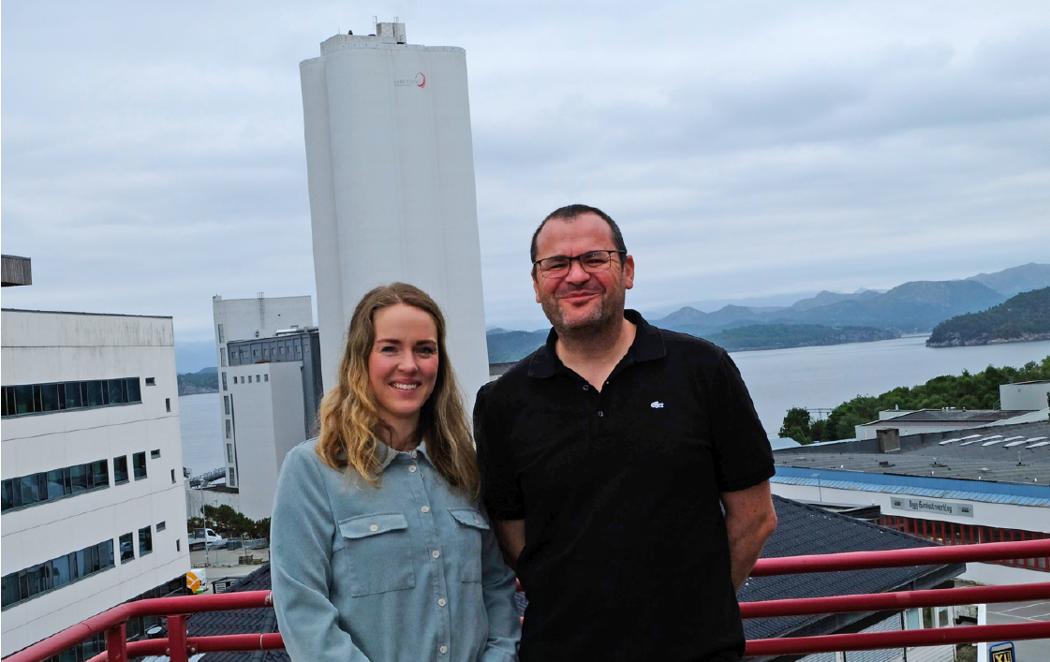
In Skretting we don’t limit our work to only reduce our sales of CIA. We want to be transparent and are open to engage and collaborate with external stakeholders to find new alternatives that reduce the dependency on any antibiotics. As a global player producing feed with antibiotics, we acknowledge that there are several dilemmas we continuously consider when using antibiotics:
- The animals’ right to get treatment if they are sick.
- To provide CIA or not when there are no alternatives after 2025.
- There are few antibiotic options registered for aquatic animals.
- Generally, Skretting does not choose the antibiotic, as we supply the medicated feed based on a prescription. The veterinarians prescribe and select the antibiotic after investigating and diagnosing the disease. Through our technical team we work closely with our customers to share knowledge and discuss alternative treatments or vaccines. However, in some cases a CIA is the only antibiotic that works and/or is available to treat specific diseases.
- Production of medicated feed in best manufacturing practice conditions compared to farmers mixing themselves. Skretting could stop producing feed containing antibiotics, but by doing so we risk pushing antibiotic usage further down the production chain to topdressing feed on-farm. A move that would effectively be useless in the challenge of reducing antibiotic resistance. To the contrary, Skretting produces in safe environment where our workers are protected, the final dose are controlled, and the production is done with high quality standards
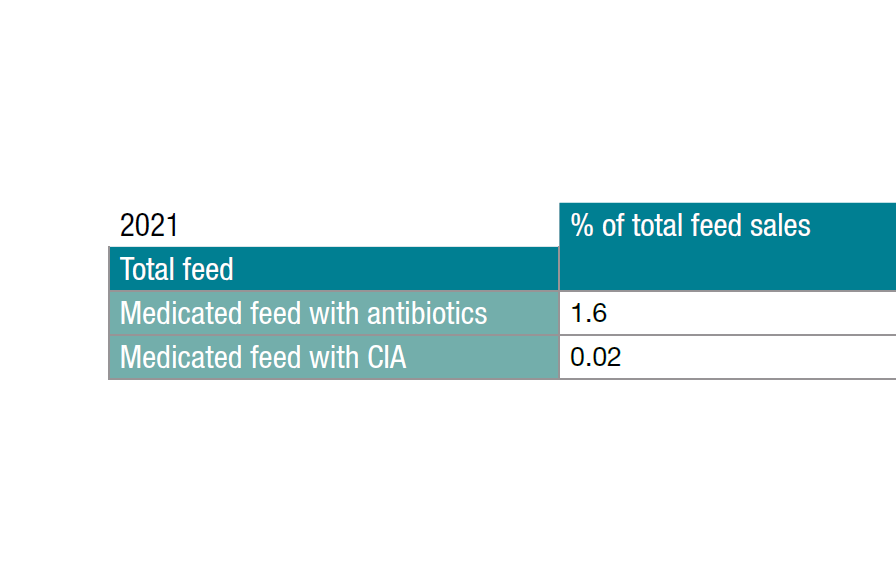
Our customers care about their animals, and in close collaboration with them, several initiatives have been started in our OpCos to ensure best-practice and reduce the antibiotic dependency. Some examples are listed below
- Testing diseases prevention programs to reduce antibiotic treatments in areas where we identify challenges.
- Development of technical customer support in bacteriology including antibiotic sensitivity assessment (antibiograms) in countries where that has not been standard procedure.
- Awareness campaigns to support farmers to use antibiotics in a responsible way including an app to calculate the dose fast and accurately.
- Continuous health education of farmers including vaccination.
As a component of our focus, Nutreco developed an AMR working committee consisting of experts from Trouw Nutrition and Skretting. For more details, please read our corporate sustainability report.
Initiatives
Skretting Vietnam – Farmers are “changing to SUCCESS”
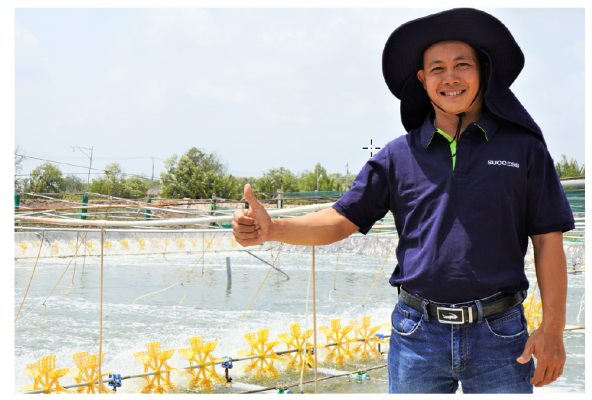 Vietnamese shrimp farmers are becoming increasingly aware of the harmful effects of improper antibiotic use and AMR consequences for the aquaculture industry on animals, the environment and on human health.
Vietnamese shrimp farmers are becoming increasingly aware of the harmful effects of improper antibiotic use and AMR consequences for the aquaculture industry on animals, the environment and on human health.
Mr. Trieu, from Bac Lieu, is a Skretting customer who wanted to stop using antibiotics under the Aquaculture Stewardship Council (ASC) standard, to affirm product quality and commit to providing safe products to consumers. To enhance efficiency, he replaced the old farming processes with Skretting Vietnam’s SUCCESS program. He has seen the effectiveness of applying the SUCCESS program with a set of recommendations including biosecurity, input water treatment, pond management process (feed, environment and shrimp health) and output waste treatment process during the production cycle.
“The SUCCESS protocol helped me to build the perfect barrier around the farm to protect shrimp from pathogens that I have encountered in previous seasons,” he said. “For the first time in my life, I have been able to produce shrimp without the use of antibiotics.” He also mentioned the effectiveness of the feed quality when switching to Skretting products. “My shrimp after 93 days are growing faster, are healthier and are harvested in a shorter period of time with a successful result.”
Skretting Vietnam continues to support shrimp farmers with nutritional solutions, technical services, and trainings on responsible use of antibiotics and innovations to feeding an antibiotic-free future.
The search for tools to support animal health
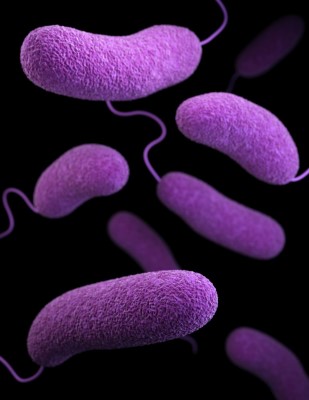 In our search for tools to support animal health, Skretting entered a joint collaboration with a company focusing on bacteriophages called Proteon Pharmaceuticals.
In our search for tools to support animal health, Skretting entered a joint collaboration with a company focusing on bacteriophages called Proteon Pharmaceuticals.
Bacteriophages, commonly known as phages, are micro-organisms naturally present in the environment. Bacteriophages have a highly specific mode of action and as such they are safe for humans and animals. They are considered an effective tool for fine tuning the microbiome and limit the proliferation of antimicrobial resistant bacteria. In conclusion, these are a tangible and sustainable solution for health management and can safeguard animal health whilst promoting the farm’s productivity.
Proteon Pharmaceuticals has worked with bacteriophage technology for over 15 years, and has developed products to help most animal production industries. Their mission is to reduce the unnecessary use of antibiotics, promote animal health and minimise economical losses for farmers.
Proteon developed a phage product that Skretting is currently distributing in India aiming to support heath management of farmed fish. This product has promising potential in our market and can be used on a wide variety of freshwater and seawater fish species.
In addition, Skretting and Proteon together are co-developing a product to support health management in shrimp. Shrimp face numerous health challenges caused by viruses, parasites and bacteria. For the latter, they’re usually found naturally in the environment and can cause health issues in some specific situations. The health issues translate to a loss in the shrimp farming industry of billions of USD dollars yearly. Hence, we put this high on the agenda in our R/D efforts going forward.
By developing tools to support animal health, we want to contribute first-hand to the fight against AMR and envision a sustainable future for the aquaculture production industry.
Skretting Ecuador – 100% antibiotic-free
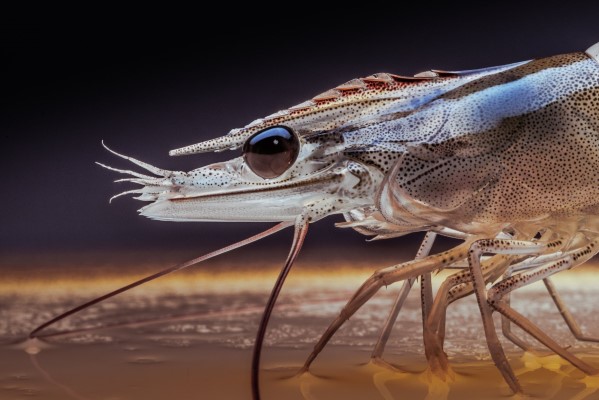 Skretting Latin America, as part of the food chain, has a solid mandate to produce non-medicated aquaculture feed, supporting the requirement of global seafood markets from our customers. To deliver on this end goal, we highlight the proper way of feeding, using best practices, ensuring the highest level of sanitary conditions in ponds, shrimp welfare, and high quality of feeds in terms of physical aspects and nutritional values. One of Skretting’s customers, Omarsa, is focused on a sustainable future.
Skretting Latin America, as part of the food chain, has a solid mandate to produce non-medicated aquaculture feed, supporting the requirement of global seafood markets from our customers. To deliver on this end goal, we highlight the proper way of feeding, using best practices, ensuring the highest level of sanitary conditions in ponds, shrimp welfare, and high quality of feeds in terms of physical aspects and nutritional values. One of Skretting’s customers, Omarsa, is focused on a sustainable future.
“It’s important that all people around the world are conscious of the use of medications in feed and food production, where the discriminated use of the medications can generate the reproduction of super bacteria which are more difficult to eradicate, mainly in the shrimp aquaculture system, affecting the industrial sustainability, environment and consumer health. In Omarsa (Operadora y Procesadora de Mariscos) the main purpose is guaranteeing the sustainable food to millions of families, ensuring the whole production chain to sell shrimp medication free,” says Sandra Pardo, Financial Manager at Omarsa.
Skretting Norway - Innovating with blood sampling
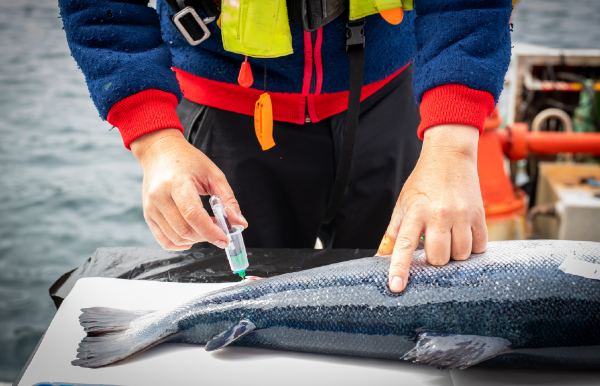 Handling fish is something most farmers need to do several times during the production, due to delousing, sorting, changing site, etc. In 2019 Skretting Norway launched a blood sampling kit for Atlantic salmon through our service team in ATLA.
Handling fish is something most farmers need to do several times during the production, due to delousing, sorting, changing site, etc. In 2019 Skretting Norway launched a blood sampling kit for Atlantic salmon through our service team in ATLA.
Through our research at commercial farms, and in controlled field trials, we gained knowledge about blood markers in salmon. The blood-markers that we have identified provide insights on stress levels, antioxidant status or if there are any indicators of disease. Sometimes the samples can indicate what kind of disease the fish has.
Despite the additional information blood samples provide, we know that the blood samples alone are not enough. Together with other available tools at Skretting Aquaculture Innovation (AI), like genetic analysis and PCR combined with production data from farming sites, we can gain targeted information about the fish.
The collaboration with our customers has been crucial in starting up this service. Our health monitoring service has continued to expand to include more tools.
During 2021 gene expression analysis started to be often conducted in addition to blood analysis. Through genetic analysis of heart tissue, we can measure how specific genes involved in disease development are up- or down-regulated. Using this technique, we have been able to predict disease outbreak a month before it actually started. This is epoch-making and can help the farmer to take action that can minimise the consequences of a disease.
It is important to emphasize that this area is still far from being fully developed. We are sure this will further develop as we go along and collaborate together in-house and with customers, finding new markers and have a better understanding of fish health.

Next
Pillar 2: Climate & circularity
Our ambition is to be the leading partner in driving the journey towards an even more sustainable aquaculture industry. 2021 was a year unlike any other due to complex supply chain issues.
